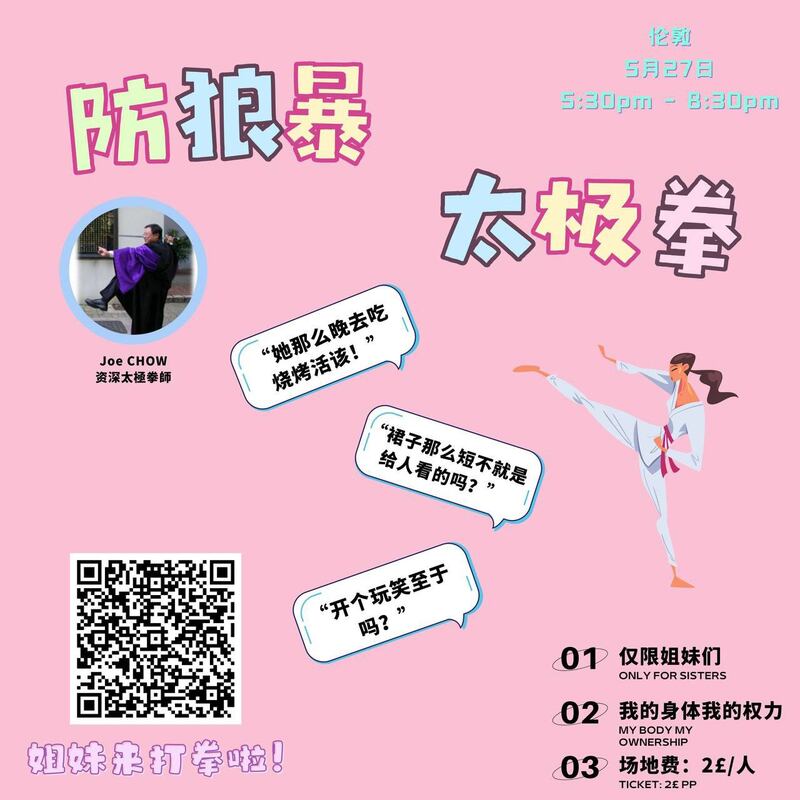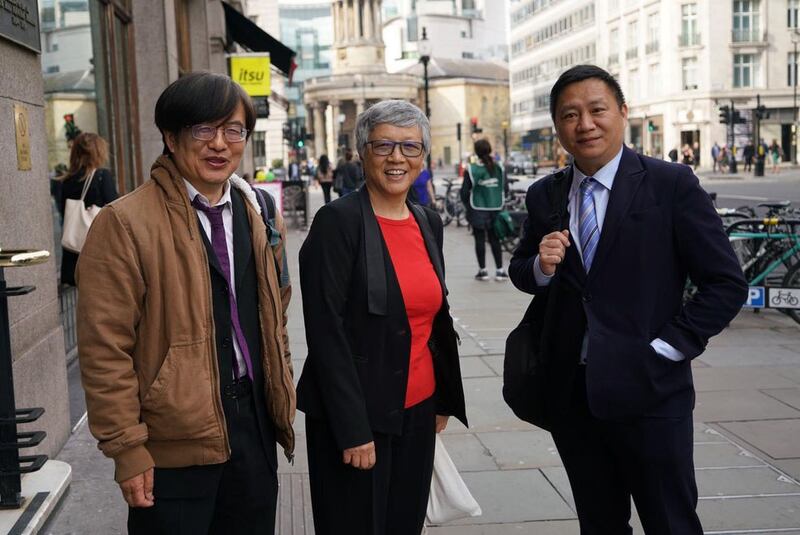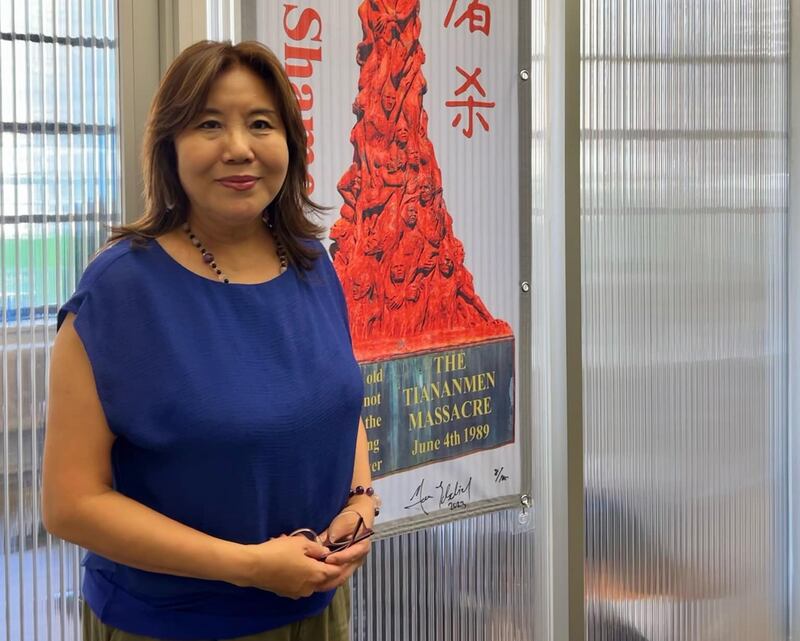It's June, and a young woman is standing on a public square in a major world capital shouting: "Free China! This is still our responsibility! June 4th isn't our history – it's our current political reality!"
Her nickname is Queshi, a student from China who has come to London's Trafalgar Square to mark the 34th anniversary of the bloody crackdown on weeks of student-led protests in Tiananmen Square and across China by handing out leaflets and educating passers-by about a seismic event in her country's recent history.
Now a member of the U.K.-based protest group China Deviants, the kinship and sense of shared purpose that Queshi believes she shares with the cohort of 1989 protesters, now in their 50s, is palpable.
But where does it come from?
It comes, at least in part, from the fact that many of those who stood up on Tiananmen Square, the seat of the ruling Chinese Communist Party, to demand democracy and the rule of law were young women like her.
“What do I hope to achieve by coming out onto the street? I want to shout at the top of my voice,” Queshi told Radio Free Asia.

“It has always been so much easier for men to grab the podium – why? Because women are told to behave well, and to keep quiet, so we always get men's voices taking power, not women's.”
“As soon as I realized this,” Queshi said, “I stopped being a good little girl, and started speaking out very loudly.”
Historical erasure
Growing up in China, Queshi had scant idea of what happened on the night that fell between June 3 and 4, 1989, when the People's Liberation Army fired machine guns at unarmed civilians and drove tanks over protesters on the orders of supreme leader Deng Xiaoping to put an end to weeks of "counterrevolutionary turmoil" in Beijing.
She didn't get the whole story until she arrived in the United Kingdom.
“I realized then that women's rights can't be separated from mainstream politics,” Queshi said. “We need a certain amount of political influence and political power to achieve those rights.”
"The Communist Party isn't just a totalitarian regime; it's a highly patriarchal system ... in which women and ethnic minorities are just there for decoration," she said.
When Queshi looks at historical footage and photos of the 1989 student movement, she sees that women were still very much confined to support roles, with their contributions overlooked ever since.
"When I started to learn feminist theory, like power structures, inequality and the invisible exploitation of women, I learned that women are always erased in historical accounts," she says.
"This is actually relevant to the 1989 movement, where women worked incredibly hard, but the photos taken and the documents handed down are mostly about the men," she says.
‘You're the first to ask’
Former 1989 student leader Wang Chaohua agrees with Queshi.
“Her observations are pretty sharp,” Wang, who led the Peking University graduate student federation, or Gaozi.

Wang and fellow activist Chai Ling were the only two women to appear on the Beijing police department's wanted list after the crackdown. She remembers being taken to the men's dorm at Peking University by Chai, who introduced her to prominent leader Feng Congde.
The problem was that all the student leaders' meetings were held in male college dorms, in crowded rooms packed full of young men, with the women relegated to helping from the sidelines.
"When we would go to visit other universities to see how the movement was progressing, I learned that it was the male dorm we needed to visit in each school," Wang says. "The women activists were treated like the male activists' secretaries."
At 37, Wang was much older than most of her fellow activists in 1989, and her age gave her more of a platform among the undergraduates.
“My role was that I was older than everyone else, whereas Chai Ling was in a weaker position, yet she was full of passion, and had this image of someone pure and idealistic," Wang said.
“That image was strongly appealing [to the media] all the way through the hunger strike,” she said.
But Wang doesn't often get asked about the role of gender in 1989.
“In more than 30 years, you're the first to ask,” she said. “The issue of gender roles has been erased from history, or at least marginalized.”
Women’s rights not mentioned
Lu Jinghua was part of an emerging breed of Beijing businesswomen in 1989. When the protests started, she shut up her clothing store and pitched in collecting donations and gathering supplies for the students.
“I saw a group of students carrying donation boxes … [saying that] some students were on hunger strike” Lu recalled, adding that many had arrived from places far from Beijing. "A lot of the protesters had come from elsewhere in China and had nothing to eat or drink."
"We thought we local people could help them out, these young people who came from out of town," she said. "Everyone got together to give them supplies, like cans of pop and home-made steamed buns."

Lu moved in very different circles to Wang and Chai, and joined the Beijing Workers' Autonomous Federation that organized workers to take part in the protests. She worked as an announcer, broadcasting updates on the movement over a tannoy in Tiananmen Square.
“We had all been traditionally educated, so we weren't likely to have any of the more radical ideas,” Lu said, adding that she had little awareness of feminism at the time. “Maybe I had some, but its voice was very weak, and nobody made a point of bringing up the topic.”
That chimes in with Wang's memory of the movement. She noted that women's rights weren't mentioned when students gathered to discuss which topics they wanted to raise with Chinese leaders.
In fact, she remembers women having more power and agency during the political turmoil of the Cultural Revolution between 1966 and 1976. Their rights once more took a back seat when Deng Xiaoping began his economic reforms in 1979, she said, but have since gotten worse.
"Over the past 20-30 years of economic reform, the bureaucrats have become rich and powerful. We often heard during the anti-corruption campaign about them having so many young women,” Wang said, adding that women had been increasingly “relegated to the position of providing sexual services in the middle of political power struggles.”
"It has become normalized — a matter of course,” she said.
A mockery
Lu agreed, noting that Chinese President Xi Jinping's wife Peng Liyuan never uttered a word in public when a woman was found chained by the neck in an outhouse in the eastern province of Jiangxi in 2022.
“What contribution has Peng Liyuan made to [empower] Chinese women?” Lu said. “Has she visited them at a grassroots level? Does she understand their pain?”
“The Jiangxi chained woman scandal broke in March 2022 and Peng Liyuan represented Chinese women as special envoy for women and children at UNESCO,” she said. “That made a mockery of the role.”
For Queshi, women are much more front-and-center in Chinese activism today, taking a prominent role in the wave of "white paper" protests that swept the country in November.
Yet they have also paid a heavy price, with four young women – Cao Zhixin, Zhai Dengrui, Li Yuanjing and Li Siqi – detained in Beijing for taking part in the protest now being seen as symbols of the movement, including for the considerable personal cost they sustained.
Queshi said she won't stop at commemorating the 1989 massacre, but will always include women's rights as part of her political activism.
"Maybe letting everyone know about feminism will awaken some civic awareness in some people, and gradually lead them to criticize the entire political system," Queshi mused. "Feminism could actually have a much bigger impact [than other approaches] in mainland China."
Translated by Luisetta Mudie.
